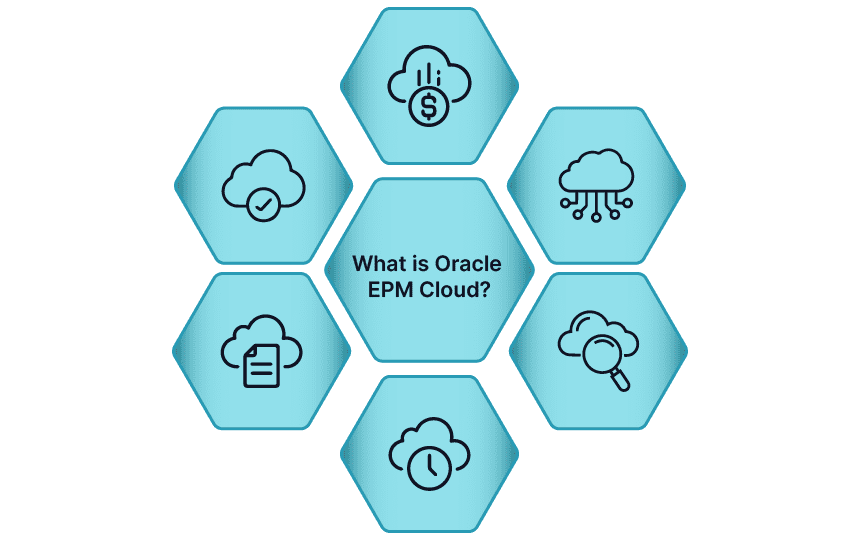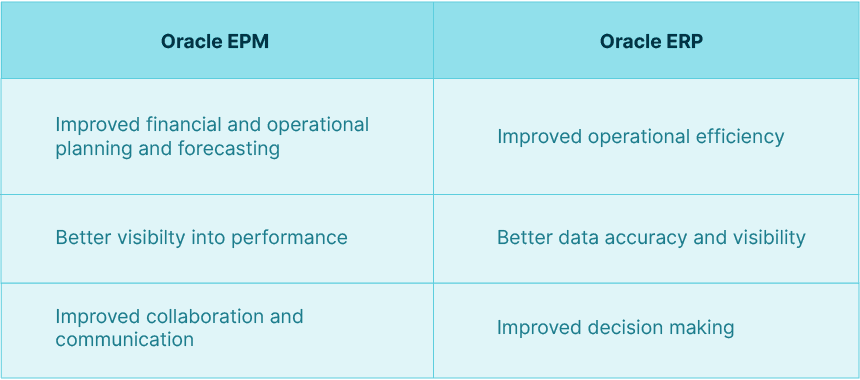Oracle EPM is a single platform for organizations that need end-to-end modules for financial consolidation, close process management, analytics, tax reporting, account reconciliation, data integration, narrative reporting for financial close, and more.
The solution is considered a premiere solution for financial consolidation, though it can also be used for HR, supply chain, marketing, IT, and more. Oracle Cloud EPM comes with capabilities that can cut financial close down to as little as 5 days, as well as assisting companies in modeling and planning across many different operational areas.
This blog will explore the main elements of Oracle EPM, and delve into how to maximize its efficiency and test it strategically. Let’s get started!

What is Oracle EPM (Enterprise Performance Management)?
Oracle Cloud EPM is a Cloud enterprise performance management platform that enables organizations to respond quickly in a changing regulatory environment. Oracle EPM allows organizations to adapt quickly to new requirements and deliver faster, more accurate insights to all stakeholders. EPM helps you streamline the financial close and report with confidence and insight. It leverages automation, tax provision, tax reporting, and other capabilities to keep your business compliant in a dynamic marketing landscape.
As a Cloud-based solution, Oracle Cloud EPM focuses on managing financial performance. It covers critical aspects that need special attention, like budgeting, forecasting, financial reporting and analytics, financial consolidation, and close management.
How is Oracle Enterprise Performance Management (EPM) different from Enterprise Resource Planning (ERP)?
Oracle’s Enterprise Resource Planning (ERP) is a broader business management solution that covers various aspects of a business’s operations, including finance, HR, supply chain, and customer management.
Oracle’s Cloud Enterprise Performance Management, on the other hand, covers different aspects of financial performance management, such as planning, financial consolidation and closing, account reconciliation, profitability and cost management, tax reporting, and Enterprise Data Management.
EPM Vs. Oracle ERP

What are the business benefits of Oracle EPM?
- Efficient Planning and Budgeting: This solution streamlines planning and budgeting processes. This enables businesses to create accurate forecasts and allocate resources effectively and in a timely manner.
- Data Accuracy and Integration: EPM supports enterprise data management. It ensures data accuracy by integrating with various data sources, providing a unified platform for comprehensive and reliable financial information.
- Enhanced Decision-Making: Oracle EPM empowers businesses to make informed decisions based on real-time insights and data-driven analysis. It also helps in cost management.
- Improved Financial Consolidation: The solution facilitates seamless financial consolidation, reducing the complexity of financial reporting and ensuring compliance with accounting standards.
- Risk Management and Compliance: It helps businesses identify and mitigate risks through advanced modeling and scenario analysis, ensuring compliance with regulatory requirements.
What’s Included in Oracle EPM?
The following are modules of Oracle EPM:
Enterprise Planning and Budgeting Cloud Service (EPBCS)
- Search-driven planning, simulation, and machine learning
- Frameworks: IBP, Predictive WFP, real-time collaboration
Financial Consolidation and Close Cloud Service (FCCS)
- New Journal Entry Module
- Automatic consolidation and journals, data lineage
- HFM migration toolkit
Account Reconciliation Cloud Service (ARCS)
- Alerting and case management
- Dynamic workflows and auto reconciliations
- Transaction matching
- Enhanced views
- Dashboards
- Data management
Enterprise Performance Reporting Cloud (EPRCS)
- Collaboration: web-based capture, task notes, social
Enterprise Data Management Cloud (EDM)
- Custom form-based governance
- Multi-request visualization and approval
- Mass updates
- Subscription rules
- Support for large 100M+ member dimensions
- Rule-based matching and rationalization
Profitability and Cost Management Cloud (PCMCS)
- Data entry forms
- Sync reporting DB
- Workflow via CM
Tax Reporting Cloud (TRCS)
- Long-range tax planning and simulation
- Predictive tax analytics
- Configurable tax reconciliation
Oracle rolls out patches containing bug fixes, code optimization, and feature updates every month. This means that Oracle Cloud EPM users will receive new tax, legal, and regulatory updates, as well as bug fixes and software optimizations.
How to Keep Oracle Cloud EPM Current
Managing the frequent patch updates in Oracle Cloud EPM can be challenging. Issues, delays, and bottlenecks in testing the new updates can potentially lead to downtime and even compliance and legal issues. Let’s explore how test automation can prevent these costly errors and maximize efficiency.
Watch: The Essential Blueprint for Automated Regression Testing Your Oracle EPM Monthly Updates
Oracle releases a patch containing bug fixes, code optimization, and feature updates on the first Friday of the month. This patch is applied to the test environment during the next Daily Maintenance window following a patch release. Production environments are patched on the third Friday of the month. Customers only have a two-week window to validate patch updates.
Manual testing is simply not practical, considering the complexity of the applications and interconnections within them. Test automation is a logical solution for Oracle EPM testing.
Learn more: Addressing Oracle EPM Cloud Update Challenges with Continuous Test Automation
How Can Opkey Help?
Opkey is an official Oracle partner and the industry’s leading test automation platform. Opkey is ideal for EPM testing, the #1 rated app on the Oracle Cloud Marketplace, and a trusted ally for Oracle customers. Opkey provides prebuilt EPM auto scripts to facilitate adopting an automated regression testing process that reduces the time it takes to complete regression testing each month. Organizations can enjoy risk-free EPM updates with Opkey.




